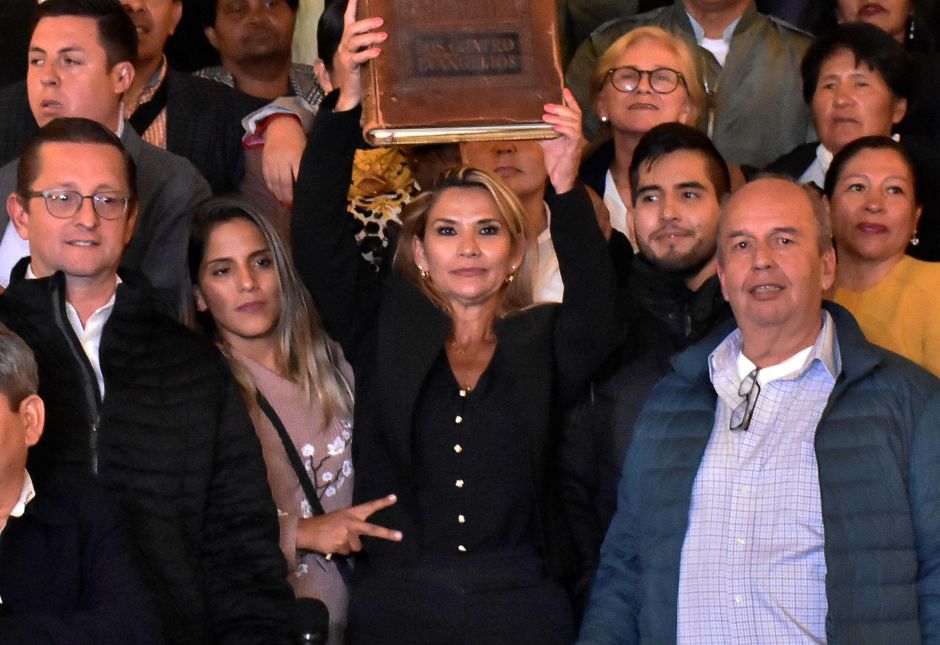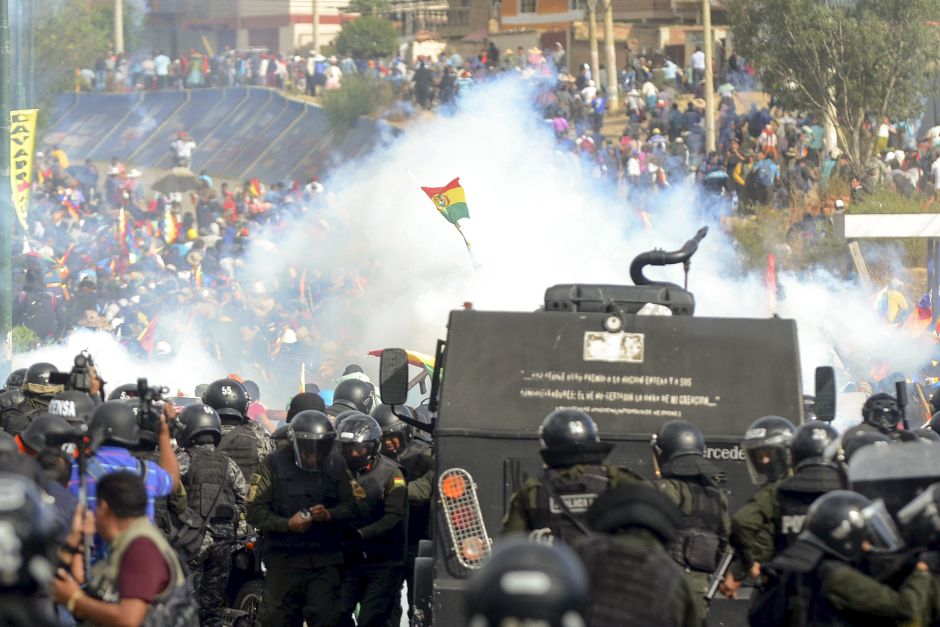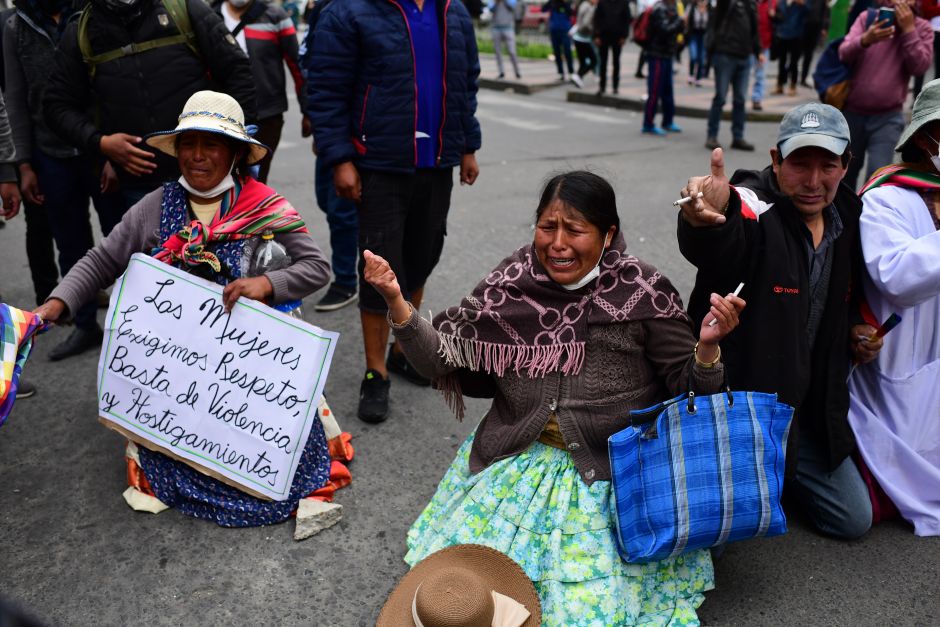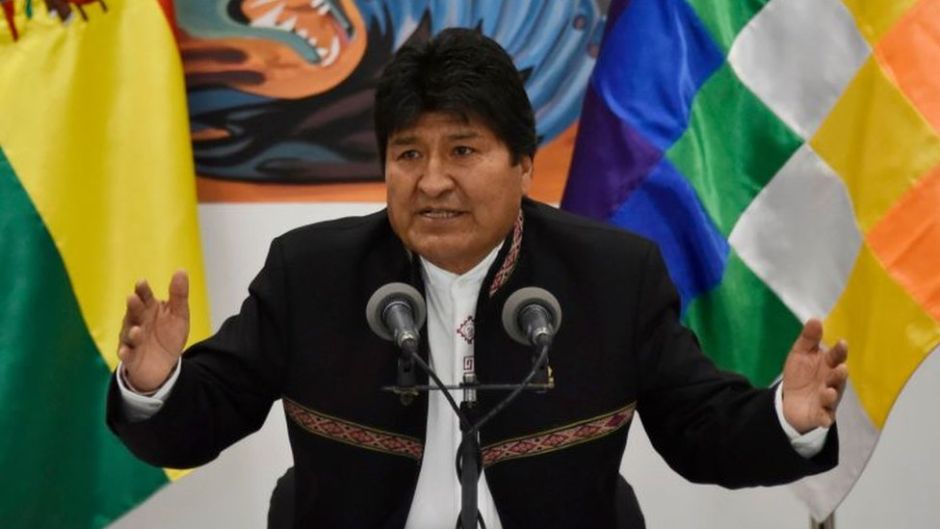Some Bolivians in Los Angeles express opinions about the Evo Morales case
Bolivians in the United States seem to be divided around the conflict that Bolivia is experiencing after the resignation of President Evo Morales. While some consider that it was a coup; others say it was a civic uprising.
Much of Shannon Camacho's family lives in Cochabamba and La Paz, Bolivia.
“It's very complicated what's happening there. Especially my mom is very worried because she supports the Quechua and Aymara people. Evo was trying to lift the town, ”says Shannon, daughter of Bolivian immigrant parents, who feels very connected to Bolivia.
“We are worried about the tension of the last weeks and days. The violence is very scary, ”he says.
And he admits that he disagrees with Senator Jeanine Áñez who proclaimed herself president of Bolivia holding a Bible. "It is very sad. We do not see her as a legitimate president. She is going to end people's rights. Evo won with the majority, ”he says.
On the other hand, Shannon says his family is happy that Evo Morales has found refuge in Mexico. "Individually, he has made mistakes, but no one can deny that his policies have helped the poorest and the indigenous people of Bolivia, and has helped end inequality."
He affirms that what they most want is that there be more journalistic coverage of what is happening in Bolivia, but they also expect that there will be elections soon, and that these be observed by international groups.

Sad and worried
Sandy López was born 31 years ago in La Paz, Bolivia, but has lived since 12 years in Los Angeles. However, she and her family are very connected and involved with everything that happens in their home country.
“There is a lot of sadness because part of my family is there like my grandmother and my aunt,” says Sandy.
And he recognizes that his family is divided, some against, and others approve of the military coup.
But she disapproves that Evo has been forced to resign. “After he left, everything ugly began. They burned my nephew's school, there was no police. My grandmother had to be on vigil. Among all the neighbors they helped each other, it was chaos, something very sad, and we are here without being able to do anything, with much helplessness, ”he says.
And let her know that she looked at Bolivia as it was before and after Evo.
“He decreased poverty. The country was progressing. Now we are returning to the years when I was a child. I was very proud to have an indigenous president who put the indigenous people high and asked for respect for them, ”he says.
And he firmly believes that what happened in his country is a planned coup d'etat.
"Behind that, we feel they want to exploit lithium, our sea of white gold," he says.
And he considers hypocrisy that Áñez has proclaimed herself president using the Bible.
"I am a Christian and we never have to raise God's name in vain," he says.
This young woman is very grateful to the government of Mexican President Andrés Manuel López Obrador for giving him asylum.
"I wish there was peace and tranquility in my country instead of separation, insults and hatred," he says.

Evo was a dictator
Ingrid, a Bolivian who lives in the US, and who asks not to reveal her last name, says that at first, Morales did things that were good, but then, he says, he became a dictator.
“The town was tired of being forced to march and continue under its yoke. They got tired of their evil and got up. He was not a true indigenous. He abused the natives, the people of the countryside and those of the offices, ”he says.
Ingrid asked her countrymen to stop hurting themselves. “We have always loved each other. We have been a homeland that we have worked honestly. All we want is peace, ”he says.
But he criticizes that although Evo left power, "continue to incite revolution and vandalism while people are suffering and suffering."
This Bolivian says that although for 19 years she has not been able to go to her country because she is undocumented, she is always in contact with her homeland.
“I was excited when Evo won the first time. I voted for him. But it changed and made people stand against each other, ”he says.
And he says that his heart has been in Bolivia, and he has not been able to sleep watching the homemade videos sent by the families where he says the people are beaten and stoned by the vandals.
"I ask people to read, and do not get carried away by yellowish news that make Evo's hoaxes believe that it was a coup d'etat," he says.

Miguel Tinker: Bolivians must seek a peaceful solution
Venezuelan professor and historian Miguel Tinker Salas says it is essential that Bolivians seek a peaceful solution to the conflict in which Bolivia is submerged since President Evo Morales was forced to resign under pressure from the army.
The Pomona College academic in Claremont, California, says that even if some sectors are against Evo Morales, we must not forget that he won the presidency with 63% of the vote.
On Bolivian immigrants who live outside Bolivia, and support their exit, he says that those who are outside do not always reflect the country's experience.
Tinker Salas has no doubt that it was a coup d'etat what happened in Bolivia. "When the army asks a president to resign it is a coup; and even when the election made president to Evo is questioned, he won with the majority"He emphasizes.
“The project that Evo was leading had very important support, and the violence that is seen today, takes back the social changes that his government had achieved such as the reduction of poverty for a high percentage of the population,” he says.
And make it clear that every time he was re-elected, there is no doubt that he was elected, and there was no evidence of fraud.
Tinker Salas argues that behind the coup d'etat is the Creole class, an elite of eastern Bolivia who in 2008 tried to separate from the country. "They joined the army against Morales and took power, but they have not been able to consolidate their government amid mass protests," he says.
The academic cannot assure that the United States was behind the coup d'etat. What is certain is that this country favors any government other than Evo. "Without a doubt, they applaud what happens in Bolivia, and it is clear that the Bolivian elite is capable of its own leadership," he says.
And he notes that Evo's mistake was to go to the Supreme Court of his country to make a ruling on whether he could be a candidate again after he tried to change the Constitution by losing the consultation.
He anticipates that in Bolivia, a country with one of the largest reserves of lithium and gas in Latin America, instability will continue.
“It will be very difficult for the government of Jeanine Áñez, who has proclaimed herself interim President, to consolidate herself. It is an illegitimate government that authorized the use of violence against the population itself. His party only got 4% of the vote in the last elections, ”he says.
And he advises Bolivians who now face each other, to seek peaceful solutions. Although he regrets that the vote is only respected when he wins. “Democracy is accepting the election results even if they do not favor us and allow the winner to govern. It was a large majority of the vote that led Morales to govern, ”he says.
The presidential term of Evo Morales technically ends until January 2020 and currently lives in Mexico, a nation that provided him with political asylum as his life was in danger.






